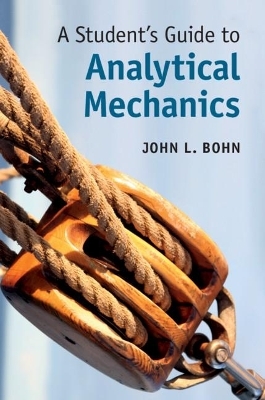
A Student's Guide to Analytical Mechanics
Seiten
2018
Cambridge University Press (Verlag)
978-1-316-50907-4 (ISBN)
Cambridge University Press (Verlag)
978-1-316-50907-4 (ISBN)
An accessible guide to analytical mechanics, clearly explaining the mathematical theory to help students formulate, solve and interpret problems in mechanics. Each chapter includes easily-visualised examples to provide context and reinforcement of important theory, and concludes with a set of exercises to test understanding.
Analytical mechanics is a set of mathematical tools used to describe a wide range of physical systems, both in classical mechanics and beyond. It offers a powerful and elegant alternative to Newtonian mechanics; however it can be challenging to learn due to its high degree of mathematical complexity. Designed to offer a more intuitive guide to this abstract topic, this guide explains the mathematical theory underlying analytical mechanics; helping students to formulate, solve and interpret complex problems using these analytical tools. Each chapter begins with an example of a physical system to illustrate the theoretical steps to be developed in that chapter, and ends with a set of exercises to further develop students' understanding. The book presents the fundamentals of the subject in depth before extending the theory to more elaborate systems, and includes a further reading section to ensure that this is an accessible companion to all standard textbooks.
Analytical mechanics is a set of mathematical tools used to describe a wide range of physical systems, both in classical mechanics and beyond. It offers a powerful and elegant alternative to Newtonian mechanics; however it can be challenging to learn due to its high degree of mathematical complexity. Designed to offer a more intuitive guide to this abstract topic, this guide explains the mathematical theory underlying analytical mechanics; helping students to formulate, solve and interpret complex problems using these analytical tools. Each chapter begins with an example of a physical system to illustrate the theoretical steps to be developed in that chapter, and ends with a set of exercises to further develop students' understanding. The book presents the fundamentals of the subject in depth before extending the theory to more elaborate systems, and includes a further reading section to ensure that this is an accessible companion to all standard textbooks.
John L. Bohn is Professor of Physics at the University of Colorado Boulder. He is a Fellow of JILA - an interdisciplinary institute for quantum physics, chemistry and astronomy - and a Fellow of the American Physical Society.
Preface; Part I. Overview: 1. Why analytical mechanics?; 2. Ways of looking at a pendulum; Part II. Equations of Motion: 3. Constraints and d'Alembert's principle; 4. Lagrangian mechanics; 5. Samples from Lagrangian mechanics; 6. Hamiltonian mechanics; Part III. Methods of Solution: 7. Hamilton–Jacobi theory; 8. Action-Angle variables; 9. More applications of analytical mechanics; Further reading; Index.
| Erscheinungsdatum | 18.09.2018 |
|---|---|
| Reihe/Serie | Student's Guides |
| Zusatzinfo | 17 Halftones, black and white; 33 Line drawings, black and white |
| Verlagsort | Cambridge |
| Sprache | englisch |
| Maße | 152 x 227 mm |
| Gewicht | 370 g |
| Themenwelt | Naturwissenschaften ► Physik / Astronomie ► Mechanik |
| Technik | |
| ISBN-10 | 1-316-50907-9 / 1316509079 |
| ISBN-13 | 978-1-316-50907-4 / 9781316509074 |
| Zustand | Neuware |
| Informationen gemäß Produktsicherheitsverordnung (GPSR) | |
| Haben Sie eine Frage zum Produkt? |
Mehr entdecken
aus dem Bereich
aus dem Bereich
Statik - Kinematik - Kinetik - Schwingungen - Festigkeitslehre
Buch | Hardcover (2021)
Hanser, Carl (Verlag)
CHF 41,95


